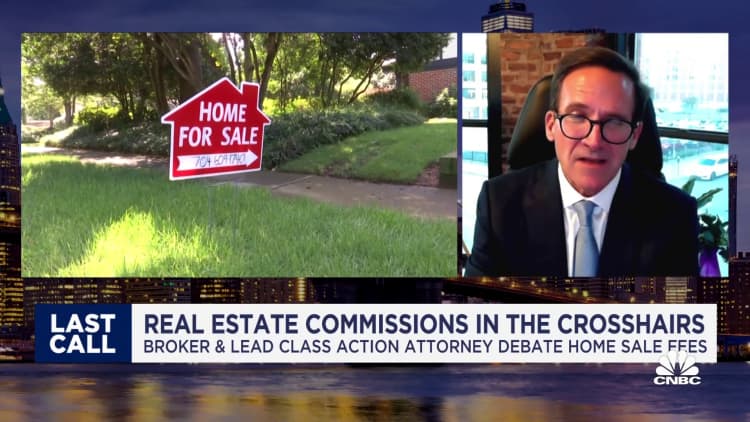36% of homebuyers and sellers don’t know they can negotiate real estate agent fees. Here’s how to do it
4 min read

Fuse | Corbis | Getty Images
When you buy or sell a home, your real estate agent’s commissions can trim thousands of dollars off the sale price — but many consumers don’t realize you can negotiate those terms.
Nearly a third, 31%, of homebuyers and sellers negotiated commissions with their agents, according to a new report by LendingTree. A majority of those, 64%, successfully reduced the fees. LendingTree polled 2,034 U.S. adults in mid-January.
About 36% of homebuyers and sellers say they didn’t know they could negotiate a real estate agent’s commission.
More from Personal Finance:
Aspiring homeowners say they face two major obstacles to buying
H&R Block used deceptive marketing, deleted tax filer data, FTC complaint alleges
Here are ways to get by without a paycheck after a layoff
That’s understandable: When buyers are budgeting costs for a new property, they often focus on the bigger things, like the down payment and the mortgage, said Jacob Channel, a senior economist at LendingTree.
“Real estate commission fees are one of the sort of less glamorous or less talked out parts of the homebuying process,” said Channel.
“Thoughts like how much a real estate agent’s going to get paid or who pays the real estate agent probably aren’t at the forefront of your mind,” he said.
How real estate agent commissions work
In 2023, the average commission was 5.37%, LendingTree found. Rates typically range from 5% to 6%, translating to thousands of dollars and the earnings are usually split evenly between the buyer and seller agents involved with the transaction. The seller typically pays those commissions at closing.
The median home sale price by the end of 2023 was $417,700, according to the Federal Reserve. That would mean commissions at a 5.37% rate amount to $22,430.49.
Yet 48% of homebuyers and sellers didn’t know how much their agent received in commission for their latest home transaction, according to LendingTree.
“The homebuying and selling experience can be so overwhelming,” said Channel. “Unless you’re paying close attention, it’s kind of hard to come up with an itemized list of what exactly you spent and where exactly you spent it.”
Some home sellers avoid these fees entirely by selling the home on their own. So-called for sale by owner homes represented 10% of home sales in 2021, according to the National Association of Realtors.
Technology has made it easier for Americans to buy and sell properties on their own through online marketplaces. But they may end up putting in more time and energy than they initially anticipate or make the process even more complicated, Channel said.
“[Real estate agents] are doing a lot of work behind the scenes that isn’t necessarily [or] immediately apparent to sellers and buyers,” he said.
Agents are often familiar with local housing market trends, know how to sell a property for a higher price and are familiar with the necessary paperwork involved in the transaction, said Channel.
“All housing markets have their own individual quirks,” he said. “If you’re a seller and you try to do it on your own, you might miss something or … not position yourself in a particularly strong way to get a good deal to sell your house for as much as you could.”
How to negotiate real estate agent fees
While real estate agents must be upfront with their fees, buyers and sellers should make sure to ask questions about what they are charging and why. An agent’s rate often depends on factors like the property type and how easily they think it will sell.
Keep in mind that agents’ “livelihoods depend on the commission fees that they make,” said Channel.
If you find an agent you like but worry about the cost, see if you can come to an agreement or reach a discount. You may have more leverage to negotiate if your home is desirable, has a high value or if your local market is hot.
Look into different agents in your area and compare their fees. So-called low-commission agents may offer fewer services, but charge commissions as low as 1% to 1.5%. Others work on a flat-fee basis.
If you’re working with a dual agent, or a real estate agent who’s representing both the buyer and seller, you might point out to them that they don’t have to split the commission with anyone. Even with a slightly lower rate, they’re more likely to take home more money if they had split 5% with a second agent, said Channel.
Antitrust lawsuit may have ripple effect on fees
As of now, the home seller is responsible for paying both their agent and the buyer’s. But that could change if a lawsuit stands.
In an antitrust lawsuit last fall, a federal jury found the NAR and several large real estate brokerages had conspired to artificially inflate agent commissions. As a result, the NAR, Keller Williams and HomeServices of America are liable for nearly $1.8 billion in damages. Re/Max and Anywhere Real Estate settled before the trial, each paying damages.
“Last month, NAR filed motions asking the Court to set aside the trial verdict and enter judgment as a matter of law in favor of NAR or, at the very least, order a new trial. These motions are part of the post-trial process, and we expect rulings on them in due course,” a spokesperson from NAR told CNBC in a statement.
A spokesperson on behalf of HomeServices of America declined to comment.
Keller Williams settled for $70 million in early February.
If the verdict stands, it could mean that a home seller won’t be required to pay the buyer’s agent, experts say. More buyers may bypass agents, or try to negotiate fees.
“Hopefully, this will give us even more transparency,” said Channel. “This goes to show … why it’s so important to pay attention to all the costs when you go to buy or sell a home.”
Don’t miss these stories from CNBC PRO:






